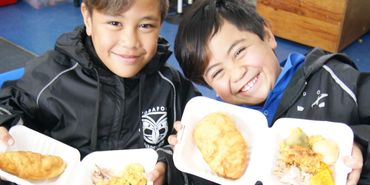OUR LOCAL COMMUNITY
MURUPARA
NGāTI MANAWA
NGāTI MANAWA
Murupara is a town in the Whakatāne District and Bay of Plenty Region of New Zealand's North Island. The town is in an isolated part of the region between the Kaingaroa Forest and Te Urewera National Park.
NGāTI MANAWA
NGāTI MANAWA
NGāTI MANAWA
Ngāti Manawa, descendants of Tangiharuru, are the custodians of Tawhiuau Mountain and the Rangitāiki River.
Rangipo, on the Rangitāiki,
is where they farewell the eels returning to sea to spawn.
GIVING BACK
NGāTI MANAWA
GIVING BACK
Kohutapu Lodge is a small family business who has been harnessing tourism to give back to its community, through youth programmes, koha (donations), food for those in need and employment opportunities.
THE TOWN OF MURUPARA
Murupara is a town in the Whakatāne District and Bay of Plenty Region of New Zealand's North Island. The town is in an isolated part of the region between the Kaingaroa Forest and Te Urewera National Park, on the banks of the Rangitaiki River, 65 kilometres southeast of Rotorua.
Indigenous Māori make up over 90% of the population. The town's principal industries are all related to forestry. Murupara is in the rohe (tribal area) of the Ngāti Manawa iwi.
Located on SH38, Murupara is the end point of the Murupara Railway Branch. The town's main industry is forestry.
Murupara lies within the rohe (tribal area) of the Ngāti Manawa iwi. The town was named after one of ten Taniwha who reside in the rivers and waterways throughout the lands. The name "Murupara" means "to wipe off mud" in Māori.
Murupara was once a stopover on the Rotorua-Napier road. In the early 1900s, exotic trees were planted, forming the Kaingaroa Forest, now 2,900 square km of pines.
As the service hub for forestry workers, Murupara grew to over 3,000 people, though recent forestry industry changes have led to a decline in population and employment.
ABOUT Ngāti manawa

OUR HISTORY
Tangiharuru settled these lands after defeating the Marangaranga in the late 16th–early 17th century. Driven by a need for his own whenua, he left Wharepuhunga in Waikato, moving through Hauraki, Tauranga, and finally Matatā with Ngāti Awa.
His plan to take Marangaranga land started at Whakapau Kōrero, where he urged his followers to act. Since then, Ngāti Manawa has protected Mana Whenua, despite the challenges and battles that followed.

OUR PEOPLE
Ngāti Manawa, descendants of Tangiharuru, are the custodians of Tawhiuau Mountain and the Rangitāiki River. Rangipo, on the Rangitāiki, is where they farewell the eels returning to the sea to spawn.
Ngāti Manawa's rohe stretches from Kaingaroa Plains to the Rangitāiki and Whirinaki valleys.

OUR ROHE
“Ko Tawhiuau te maunga, ko Rangitaiki te awa, ko Ngāti Manawa te iwi, ko Rangipo te wehenga o te tuna”
“The mountain is Tawhiuau, the river is Rangitāiki, the people are Ngāti Manawa, Rangipo is where the eels depart.”
GIVING BACK TO OUR COMMUNITY
Kohutapu Lodge, a small whānau owned and operated business have remained committed to giving back to our local community wherever we can.
- More than 50,000 hangi meals delivered for those in need
- Annual educational trips around NZ provided for a classroom of children from Murupara, all expenses paid
- Koha provided to local marae
- Two young adults attended Taratahi Farm full year scholarship, going in to full time employment
- Two young adults went to USA on a six week internship programme with one of the largest oral health care companies in America
- 52 winter school uniforms purchased for local children
- Land restoration programmes and native tree planting
- Supporting the Migratory trap and transfer of the native long fin eel annually, to ensure its survival
By 2024, Kohutapu Lodge owners had personally reinvested more than $1,000,000 back in to their local community thanks to tourism!

During Covid border closure, Kohutapu Lodge transitioned their lodge in to a youth training facility, providing three 12 week long courses for 60 indigenous youth who were not in education, employment or training. Using their indigenous tourism framework to deliver these courses, Kohutapu Lodge had over an 86% success rate of re-engaging youth back in to school, training or employment upon completion of these courses.
After 2.5 years of border closures, tourism returned. Since then, Kohutapu Lodge has started welcoming back their international tourists, and thanks to tourism once again – has successfully launched “Native Nations United” – where they have taken indigenous youth from remote communities overseas to engage with other indigenous youth and communities.
Through tourism, these youth who have never experienced international travel, have gone to VIC, Australia, QLD, Australia, BC, Canada, Penema Province, Vanuatu and through New Zealand – on a journey of connection, reconnection and healing. So far, over 55 indigenous youth have participated in these exchanges. 11 indigenous nations worldwide are now lining up to participate in these exchanges over the coming 5 years.